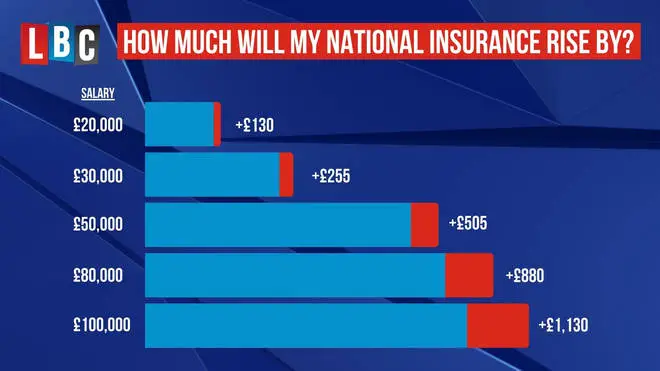
Clive Bull 1am - 4am
24 January 2022, 08:59 | Updated: 24 January 2022, 13:24

Boris Johnson has insisted he will stick with the planned hike with plans to hike National Insurance contributions – despite reports of Conservative opposition.
The 1.25% increase to pay for social care costs has been criticised by a former minister who was in the Cabinet when it was agreed - and it has been claimed members of the Government would be willing to delay the rise.
Opposition is mounting given the expected cost of living squeeze this year, with energy bills set to soar.
The Prime Minister said during a visit to Milton Keynes Hospital: "The NHS has done an amazing job but it has been under terrible strain.
"Listen to what I'm saying: We've got to put that money in. We've got to make that investment in our NHS.
"What I'm telling people is, if you want to fund our fantastic NHS, we have to pay for it - and this Government is determined to do so."

Tax hike and energy rises could mean difficult times ahead
His comments follow education secretary Nadhim Zahawi's remarks to LBC's Nick Ferrari at Breakfast, in which he said delaying the planned hike in National Insurance contributions would just be putting off a vital cash boost to an otherwise "unsustainable" care system.
Rishi Sunak, the Chancellor, has reportedly begun referring to the increase as "the Prime Minister's tax".
But Mr Zahawi defended the 1.25% rise to pay for social care costs. He said planned tax rises would raise £36 billion – and he took the opportunity to praise the beleaguered PM.
"The highest earners – and that's 14% - will pay half of that contribution," he said.
Read more: National Insurance rise: How much more will you need to pay?
Read more: 'I've not suffered Islamophobia in the Tory party': Minister hits back as PM orders probe
"The lowest paid, so 6.1 million people, will pay nothing so it's as progressive as we can make it.
"Why is it important? Successive governments have tried to deal with this and have failed, and actually have failed the elderly because this unsustainable system that we have at the moment has broken many a human being in old age because they can't afford the social care that they need.

Education Secretary doesn't support postponing tax hike
"So this prime minister, again another big decision, he's got it right on this."
The planned hike will see workers pay more from April.
A worker earning £24,100 will pay £180 a year while an employee on £67,100 will pay £715.
From 2023, working age adults over the state pension age will also contribute 1.25%.
As part of the reforms, Boris Johnson previously said he did not want anyone to have to fork out more than £86,000 to pay for care.
However, amid reports suggesting the cabinet would back delaying the tax rise, a former minister said it should be put off.
Robert Jenrick, who was housing secretary until September, was in the cabinet when the plan was approved.
But he wrote in the Sunday Telegraph that the UK should instead "exploit Britain's gas reserves" to fight the cost of living crisis.

He said: "First, it means recognising the need for the Government to intervene to help those facing brutal decisions as to what they must do without.
"But these should be targeted measures that are focused on low- and middle-income families. The size of the state is already the largest in my lifetime, and growing.
"In the medium term we need to address our exposure to volatile energy markets by increasing domestic output, and this involves utilising the oil and gas that our islands have been blessed with.
"It is absurd that we have foregone cheap, reliable energy in the name of saving the planet, only to import it at higher prices from abroad - in the process, ceding jobs and creating vulnerabilities to unsavoury actors."
He added that the fastest way to "alleviate pressures on household budgets would be to postpone the hike".